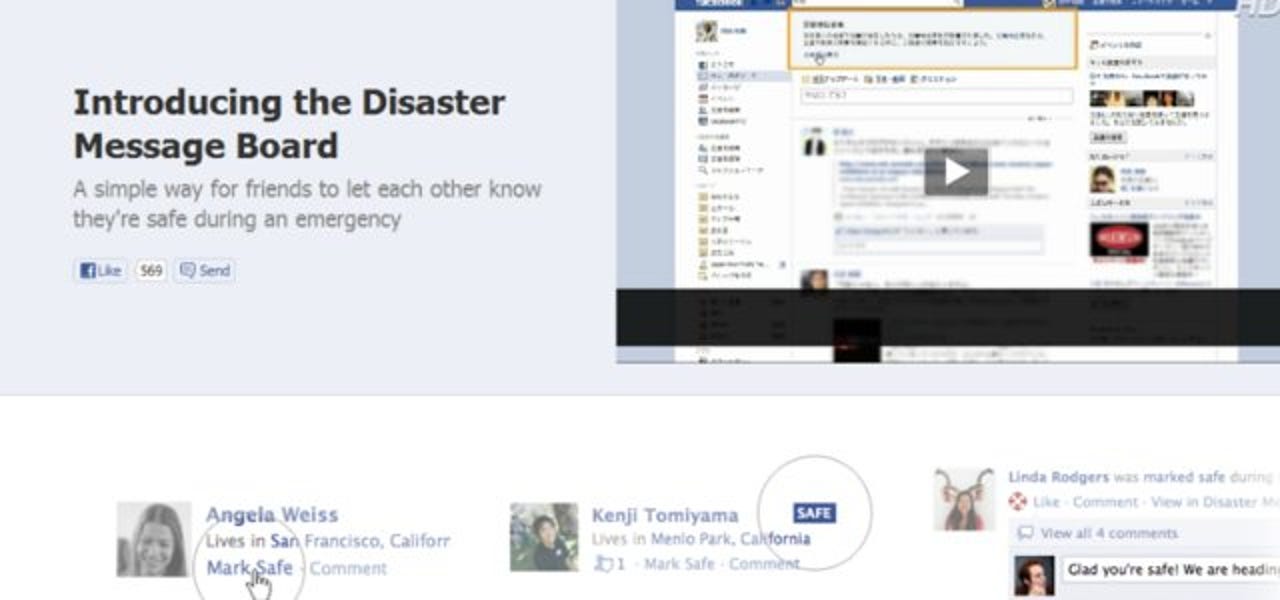Japan's social safety net: Facebook's Disaster Message Board

Facebook this week launched a two day test run of its new Disaster Message Board in Japan.
The message board is, quite simply, an easy way for everyone to get back into contact in the event of a natural disaster.
The major feature of the board is the 'safe' button. You can activate it to let your friends and family know that you are out of harms way. You can also confirm the safety of others, if you have managed to make contact with them, or they have no access to the Internet themselves.
It provides a simple way to filter and find friends, leave comments on people to update everyone on their situation, and check on those you are struggling to reach.
It is an effective use of the near ubiquitous nature of social networks at a time when you need them the most.
Almost a year has passed since the Tohoku earthquake, and Japan is still recovering.
Just yesterday morning a 5.4 magnitude earthquake shook Tokyo, and scientists predict that another "big one" could be on its way in the next 30 years.
The truth is that living in a place like Japan, it is not a question of if another earthquake will happen, only when.
Alexander d'Authreau, an English teacher who was working in Tokyo during the Tohoku earthquake, thinks the new Disaster Message Board is a good idea.
"It's actually a very good system they made," he told me. "Facebook was basically the only reliable system of communication immediately after the 3/11 quake."
He told me frankly about how trying to get through to people by phone was futile. Facebook, on the other hand, was more reliable.
"My bosses messaged me to tell us they knew what was going on. We also used it to coordinate meeting points for people stuck in Tokyo, and of course reassure people back at home."
For ex-pats and the growing community of gaikokujin (foreigners) in Japan, having a network to contact family through is especially important. The chances of getting through to home on the phone are slim.
Mobile networks are usually overwhelmed during large disasters. Even under normal circumstances, it can be a nightmare letting your family know you are safe when you function in completely different time zones.
Moreover, it provides another avenue for those with limited Japanese to keep updated and find useful information. Most people have smartphones loaded up with emergency apps, but that is not always an option. Some unlucky tourists could struggle with finding help and advice.
Of course, relying on having access to the Internet during a natural disaster might not always work out.
Having a method to confirm and comment on others could be a good way to minimise panic. Even if you can't get online yourself, if you manage to get hold of a friend or relative, they can still mark you 'safe' for everyone to see.
Many were surprised by how well the Internet held up following the Tohoku earthquake, where other services failed. Google's 'Person Finder' was released within 2 hours of the disaster. It also launched a Crisis Response and collaborated with other companies to create services to help victims.
Facebook use skyrocketed in the month following the disaster, surpassing 3 million active users in Japan on April 5th, 2011.
Japan has a huge amount of wireless hotspots available, and with vending machines rigged with Wi-Fi due to be rolling out across Japan soon, finding a way to get online is easier than ever.
After the events last year, Japan is taking damage control very seriously. Not only are a vast majority of nuclear plants offline for inspections, but the country's reliance on nuclear power is being heavily examined too.
The disaster in Fukushima, which is still not completely stable, has forced the government to reconsider the state of their nuclear plants. As it is, the country is still running well despite having only a tiny percentage of its plants online.
Of course, the Disaster Message Board is not limited to Japan, but will be available for any worldwide disasters.
Regardless of how you feel about the role social networks play in our society, the level of communication they provide is rife with possibilities to create helpful services like this one.
Image source: Facebook.
Related:
